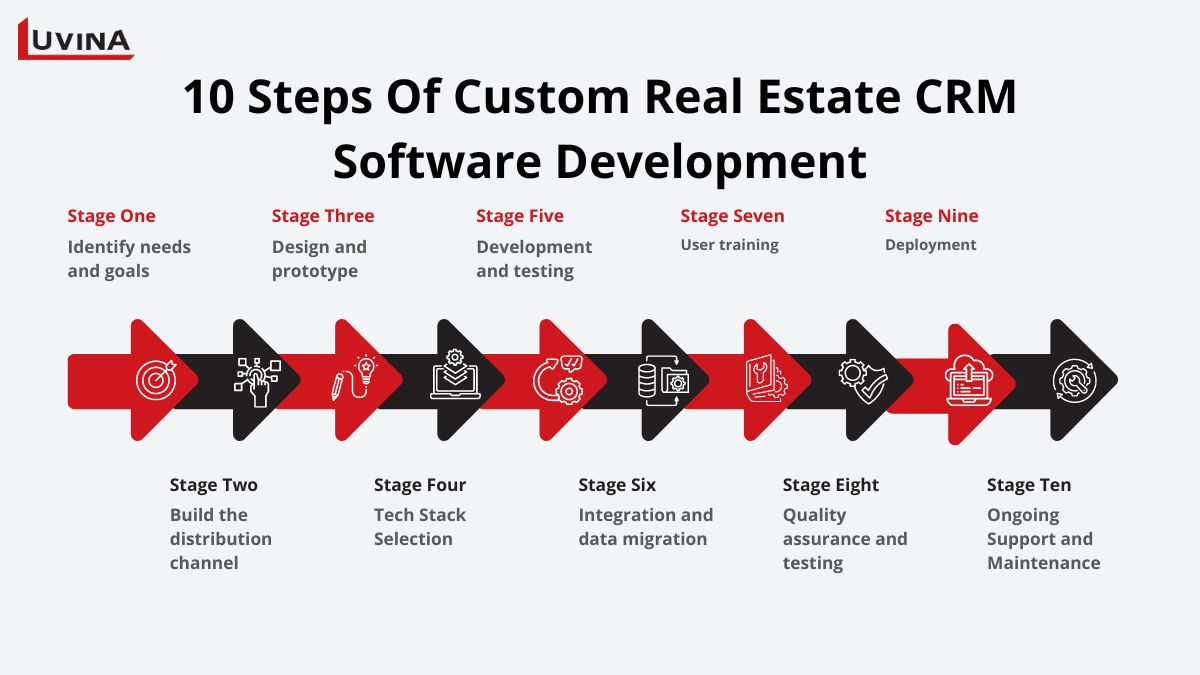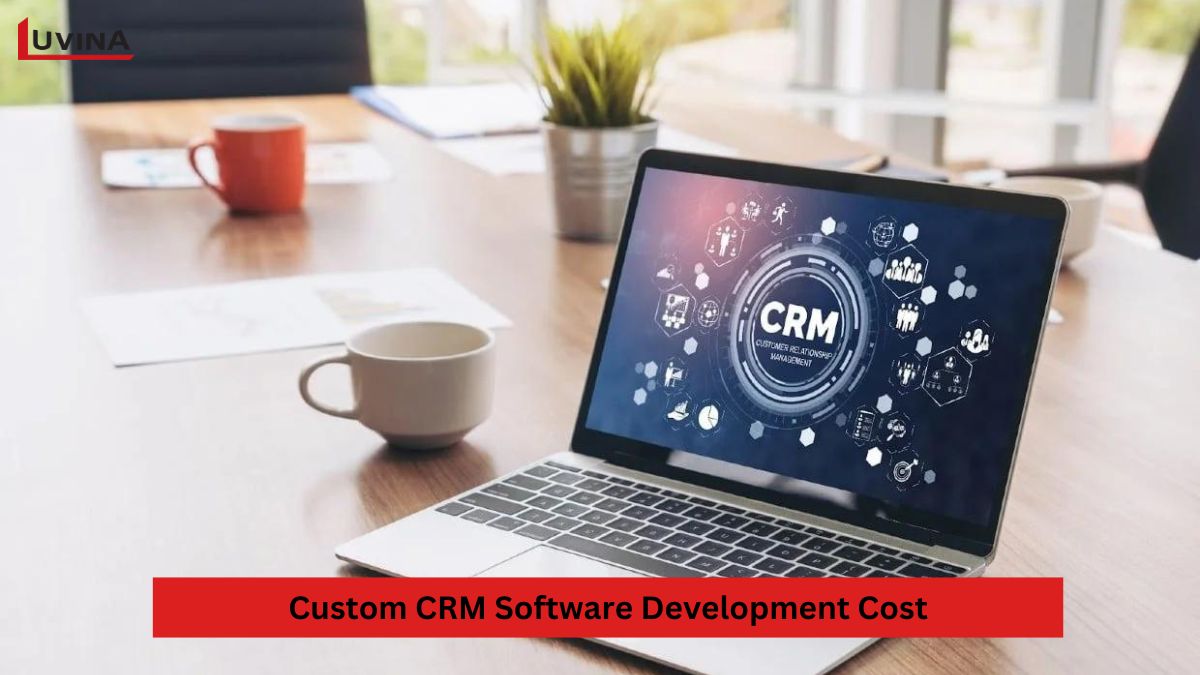According to surveys, 50% of respondents value improving contact management, and 33% prioritize sales management and lead generation when looking for CRM solutions. These are also the benefits real estate businesses target when going for custom real estate CRM software development. Never fall behind your competitors; revolutionize your real estate with customized CRM solutions.
At Luvina, a quality real estate CRM software development service will help facilitate the right solution to build strong relationships with your clients in the real estate sector. Read below to discover why you need real estate CRM software development and how to get started.
Reasons you need custom real estate CRM software development
Custom real estate CRM software is specifically designed for real estate companies. For these businesses, the importance of CRM is undeniable as it seamlessly integrates all workflows by unifying critical tasks. Custom CRM software helps companies improve performance and enhance work efficiency, ultimately increasing customer satisfaction. Here are some key benefits that custom real estate CRM software development can bring to your business:

- Streamlined lead management: Manage customer leads in one centralized place for quick tracking.
- Automation of repetitive tasks: Automate tasks such as property updates, appointment reminders, follow-up emails, and more to save time and ensure no clients are overlooked.
- Personalized customer interactions: Store essential customer information and preferences to offer personalized interactions based on this data. Personalization strengthens customer-business relationships.
- Enhanced customer support: Keep customers engaged and show that your business values their concerns, fostering a positive impression of your company.
- Increased transparency: Real estate CRM software provides clients with complete information about properties, transaction history, and direct communication with agents, building trust with customers.
- Optimized business strategies: Access detailed reports and analytics on sales channels, agent performance, and marketing campaigns, enabling your business to make more informed decisions based on data.
- Scalability: The CRM system is highly adaptable to the growing pace of your business, ensuring it supports real estate companies throughout their development journey.
Essential Features of Custom Real Estate CRM Software
Custom real estate CRM software development means creating a solution to cater specifically to the needs of the real estate industry. Therefore, the feature set of these systems must be optimized for lead management and customer interaction to improve business efficiency. Some of the key features we believe that a custom real estate CRM should include are listed below.
| No. | Feature | Functionality |
| 1 | Lead and Contact Management | Allow real estate agents to manage, track, and organize clients at every stage of the sales cycle through a unified lead and contact database. |
| 2 | Property Tracking | Efficiently manage multiple properties, filter, and retrieve property information quickly to present the right options to clients. |
| 3 | Lead Generation | Automatically gather leads by integrating agents with various lead sources. |
| 4 | Task and Appointment Management | Ensure agents stay on schedule with reminders and notifications for tasks and appointments, helping them manage their time effectively. |
| 5 | Client Portal | Enable clients to log in, view property information, and transaction history, and communicate with agents, offering a seamless customer experience. |
| 6 | Email Integration | Integrate email seamlessly so agents can manage client communications directly within the CRM. |
| 7 | Document Storage and Management | Securely store contracts and critical documents within the CRM, minimizing the risk of losing important paperwork. |
| 8 | Reporting and Analytics | Provide insights into sales performance, lead conversion rates, marketing campaigns, and other key metrics for data-driven decision-making. |
| 9 | Mobile Integration | Ensure the CRM is user-friendly across multiple devices so agents can access crucial information and manage tasks while on the go. |
| 10 | Invoicing and Payment | Automatically generate and send invoices to clients in a timely manner. |
Steps for real estate CRM software development
To achieve the goal of optimizing operations, streamlining processes, and delivering a better customer experience for real estate businesses, custom real estate CRM software development should follow these steps:

- Step 1 – Identify needs and goals: Define the software’s requirements and goals, identifying the key features necessary for lead management, customer interaction, property tracking, reporting, analytics, and other important functions that a real estate business needs.
- Step 2 – Build the distribution channel: The next step in custom real estate CRM software development is building the distribution channel. Map out the stages and design workflow diagrams integrated with automation to optimize lead management. This helps agents visualize every phase of the sales journey more easily, ensuring no potential leads are overlooked.
- Step 3 – Design and prototype: Create wireframes and visual models to demonstrate the user interface and functionalities of the CRM system to the business. This prototype will be developed based on initial requirements and suggestions, and the business will provide feedback and valuable input to adjust the prototype accordingly.
- Step 4 – Tech Stack Selection: A tech stack consists of programming languages, frameworks, and tools. While selecting a technology stack for your project, it is important not to forget about the basic pillars of the application, meaning security, integration feasibility, scalability, and competency of the developer team.
- Step 5 – Development and testing: Begin real estate CRM software development
- based on the requirements and designs defined in the previous steps. The development process should be broken into smaller phases to allow better management and continuous testing should be conducted to fix any issues throughout development.
- Step 6 – Integration and data migration: Carefully migrate data from existing systems into the CRM to ensure a smooth transition with minimal disruption.
- Step 7 – User training: Conduct comprehensive training sessions and prepare documentation to guide users on how to operate the CRM effectively.
- Step 8 – Quality assurance and testing: This is a critical step in real estate CRM software development. It ensures that the CRM system works as expected, meets all requirements, and doesn’t have any performance issues that could hinder its functionality.
- Step 9 – Deployment: After the estate CRM passes all quality checks, the software is ready to deploy. Still, it needs to be closely monitored, as sudden issues must be addressed in due course.
- Step 10 – Ongoing Support and Maintenance: Give continuous support and maintenance about resolving technical issues, update the CRM based on their business needs, and deploy security patches to protect customer data.
How Much Does It Cost To Build Custom CRM Software?
The cost of custom real estate CRM software development can be influenced by various factors, such as the types of features, design complexity, the number of resources used, and data migration services. For an accurate estimate of the cost of real estate CRM software development, you should contact specific companies to inquire about their real estate CRM software development services.

Currently, the average rate for CRM software development services is approximately $50 per hour. This rate is multiplied by the amount of time required for the development process. Additionally, since development costs depend significantly on the software features, it is essential to clearly define the functionalities you want in the CRM application and discuss any additional features with the company from the outset of planning.
How can Luvina help?
Investing in real estate CRM software development will enable real estate businesses to unlock their full potential. What you need is a company like Luvina, which offers real estate CRM software development services with over 20 years of experience. We provide professional software development services to help real estate businesses close more deals, manage better, and achieve higher revenue.
Luvina is a Salesforce CRM expert. Salesforce is a renowned customer relationship management platform that empowers businesses with its flexible and robust features. With expertise in Salesforce development service, Luvina can help businesses optimize customer interactions, streamline sales processes, and achieve outstanding CRM results. With Luvina’s support, real estate businesses can:
- Property Management: Control, maintain, and monitor properties using IT solutions, and automate daily tasks through electronic devices.
- Building Maintenance Cost Management: Accurately record equipment usage, monitor machinery conditions, and calculate costs.
With a team of over 750 experienced developers and experts, Luvina delivers top-notch CRM software development services. Additionally, we are committed to adhering to international security standards, including ISO 27001, throughout our collaboration to help protect sensitive customer information.
Contact Luvina today to find a valuable partner on your journey to custom real estate CRM software development.









Read More From Us?
Sign up for our newsletter
Read More From Us?
Sign up for our newsletter